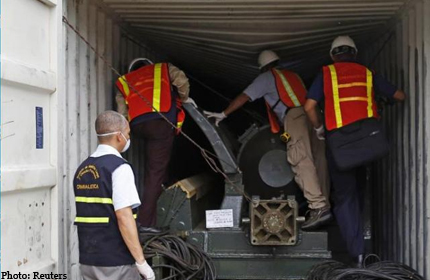
The seizure in Panama of a North Korean cargo ship carrying ageing Cuban military hardware in need of repair is more a sign of hard times in Havana than of any sinister military threat, analysts say.
Although Cuba may have violated United Nations sanctions barring military trade with North Korea, the infraction could result in little more than a slap on the wrist as the Soviet-era weaponry appears unrelated to international concern over proliferation of nuclear weapons by Pyongyang.
"Based on what we know, the military impact seems to be negligible," said Mr Philip Peters, a Cuba expert at the Virginia-based Cuban Research Center. "This material has nothing to do with the international community's core concern about North Korea, which is nuclear weapons and ballistic missiles."
The shipment included two anti-aircraft missile batteries, nine disassembled missiles, two MiG-21 aircraft, and 15 MiG engines, all Soviet-era military weaponry built in the middle of the last century.
Early yesterday, North Korea broke four days of silence, insisting that the equipment was being transported legally and demanding that the Panamanian authorities release the vessel and its 35 crew members immediately.
The Cuban military was "using weapons and equipment of staggeringly old vintage" and the Pentagon had long since written off the island as a military threat, said Dr Hal Klepak, professor of history and strategy at the Royal Military College of Canada and author of a book on the Cuban military.
Despite the possible violation of UN sanctions, the Obama administration has reacted cautiously to the Panama seizure.
It went ahead on Wednesday with scheduled migration talks with Cuba, and, rather than lash out at Havana, US officials have taken a wait-and-see approach, saying they plan to speak to the Cubans about the incident once all the facts are known.

Cuba's dire financial situation most likely led it to turn to North Korea, allowing Havana to enter a barter arrangement, perhaps for sugar, Prof Klepak added, noting that the North Koreans had repaired similar weaponry in the past in exchange for food.
While Russia and China could repair the systems, or perhaps modernise them, they would only do so for cash, he said.

